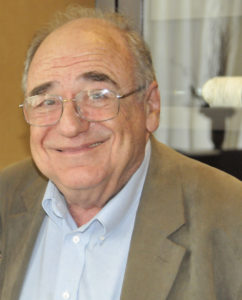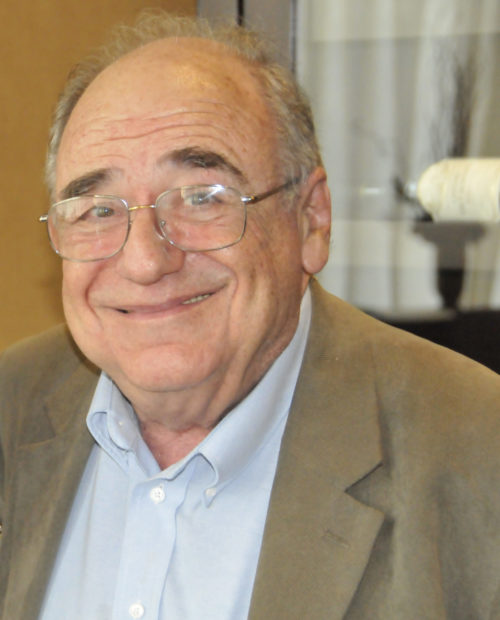
Hans Laufer was born on October 18, 1929, into a German Jewish family in Grünberg, Schlesien Germany (now Zielona Góra, Poland). The family was wealthy, owning the largest roofing tile/paper production company in Germany at the time.
Hans recalls that they lived in a large home and that he had a privileged early childhood. He has memories of the family’s excitement when they purchased the first automobile in their town. Hans’s family had numerous “servants” and Hans recalls that his father had the means to hire a personal barber to shave him each morning. The family contributed financially to their local community and provided the funds to build the town’s athletic field.
Hans’s father, Sol, was a decorated German war veteran (having served in active duty in WWI) who survived after being severely wounded in battle. Hans’s mother Margaret recalled the story that when Sol had sustained a severe shrapnel wound to his chest while in battle, he was “marked with 2 red stripes” on his chest signaling to the battlefield medics that his wounds were irreparable and that he was to be left to die. Sol had the presence of mind to remove one of the stripes on his chest when no one was looking, indicating to the medics that he was worthy of transport to a hospital for treatment of his injuries. He subsequently had his damaged lung removed and survived. Sol returned home a war hero, resumed his business activities, and involved himself in town politics.
Hans’s family were German Jews and were proud of their German heritage. During the rise of anti-Semitism following WW II, Sol traveled frequently for business, and on one occasion, while in the U.S., he was advised by his business associates not to return to Germany so as to avoid the inhospitable and dangerous conditions for Jews there. In spite of the warnings, Sol returned to his homeland to insure safe passage out of Germany for his wife and children. Sol never imagined the legal repression and physical violence perpetrated by the leaders of his “motherland”. In 1937, “they took away our business” and stripped the general Jewish population of their rights and property. The German government encouraged Jewish departure from the country but levied heavy emigration taxes and restrictions on the amount of money that could be transferred abroad. Sol’s business was considered essential to the German war effort due to its size and manufacturing capabilities and was therefore acquired by the German government. In 1938, Sol once again traveled to the U.S. with the intent to pave the way for his family to follow. He engaged his wife Margaret’s brother, an engineer working for RCA, an American electronics company, in New York City. Again, his friends and colleagues encouraged him to remain in the U.S. and send for his family, but Sol ignored their warnings and returned to Germany to join with his family.
Hans remembers Kristallnacht, the nationwide pogrom in Germany, on November 9, 1938. At the time of the attack, he and his family were sitting in a room at the front of their house when rocks shattered their windows. They quickly moved to a safer location at the rear of the house and Margaret called local police to inform them of the violence. She did not realize at the time that the attacks were targeted at Jews. That night, Sol was arrested, detained at a local prison and subsequently transported to Sachsenhausen concentration camp.
A non- Jewish friend of Margaret’s encouraged her to approach the Nazi Party directly to plead for her husband’s release. Her friend assisted her by calling the “Gestapo” (Geheine States Polizei) and the German Veterans Association so that Margaret could appeal on Sol’s behalf. Margaret learned from a “gentile cousin” whose brother was a high police official, that the only option for Sol’s release was emigration from Germany. Sol was permitted to leave Sachsenhausen only if certain conditions were met. He was ordered to: 1) Leave the country immediately, 2) Sign over all property and possessions, and 3) Never talk about the ongoings of the camps. He was warned that if he did share information about the camps that consequences would follow for him and his family, even abroad. Margaret later stated in her documentation of this time that Sol never discussed the camps with her.
When the family left Germany, Hans recalls himself leaving school. He remembers the kindness of the townspeople towards his family, but ultimately the Nazi Regime set the rules and the Gestapo enforced them. The family was “permitted” to “sign over” all of their wealth and property to a non-Jewish family before leaving Germany. The Laufers boarded a train from Germany to Amsterdam and later to South Hampton, England where they obtained safe passage on the ship “Aquatania” to their final destination, New York City. They immigrated to New York on March 3, 1939. They were not processed at Ellis Island as most immigrants were at the time. Hans was 9 1/2 years old when his family settled in Brooklyn, New York.
Hans and his younger brother Ernest enrolled in school upon arrival to New York City, but times were tough financially. His parents sold fabrics for income and Hans recalls selling matches on the street to provide additional money for his family. To help with his assimilation in the U.S., Hans recalls listening to English speaking radio at night to both learn the new language and lose his German accent. He was successful in this endeavor, but his brother Ernest was not.
Hans continued his education at Stuyvesant High School and the City College of New York. It was at City College that he met his wife Evelyn Green. Evelyn, whose parents immigrated from Eastern Europe in the early 1900’s also to escape religious persecution, was not an approved match for Hans by his culturally arrogant German parents. Nonetheless, Evelyn and Hans married and moved to Ithaca, NY to allow Hans to pursue his PhD at Cornell University. Evelyn’s parents, Isidore and Sylvia Green, themselves of modest means, managed to sponsor a lavish wedding for the couple and helped them establish a life together in Ithaca.
While in New York, Hans and Evelyn began their family in 1957 when they welcomed their daughter Jessica. Their son, Marc, followed in 1960 after a move to Baltimore where Hans completed his post-doctoral training at the Carnegie Institute and Johns Hopkins University. At the completion of his post-doctoral training, the family moved to Connecticut where Hans joined the faculty of the University of Connecticut as an embryologist/developmental biologist. Evelyn and Hans’ third child, Leonard, arrived in 1965. Hans and Evelyn raised their family with Jewish values and were affiliated with a local conservative synagogue.
Years later, Hans returned to the town in Germany where he was born and visited the family that, at significant risk to themselves, had “accepted” the Laufer’s property and assisted them in their efforts to leave the country. Th family welcomed Hans with warmth and kindness and Hans has remained in contact with them.
At 91, Hans remains active in the scientific community and has had a highly successful career at the University of Connecticut and the Marine Biological Laboratories in Woods Hole, MA. He survives his wife Evelyn who died at age 68 of ovarian cancer. Evelyn and Hans’ three children and their families remain active in their respective Jewish communities.


